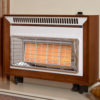There are three types of electric heater, inferred, resistive, and heatpump. After that one looks at control and distribution, so if we look at resistive to compare the different heaters we are looking at speed to heat the room, and speed to start and stop heating, and the major word is hysteresis, this is how unstable the temperature is, we aim for no hysteresis but this is near impossible.
1000 watt is a 1000 watt be it a fan heater or an oil filled radiator, or even a storage heater, the difference is how the heat is stored within the unit, so we look to the maths to start with.
So a oil filled radiator needs to be switched on say ½ hour before you use room and the fan heater ¼ hour before you use room, so if you use the room for 1 hour then the oil filled radiator is 66% efficient, but fan heater 75% efficient. However the fan heater is moving the air, so whole room is at the same temperature, but the oil filled radiator uses convection currents only, so next to window will be cooler, and next to radiator warmer, so the losses through the window are less.
A on/off thermostat will have a slewing range, the temperature it turns on at and the temperature it turns off at, the small the range the lower the hysteresis, but also it will wear out the contacts of the switching device, so storing some energy helps with on/off control, also there is the human factor, if we hear the fan stop we feel cold.
So although first glance the fan heater seems best, in real life the oil filled radiator can do better. But the time we heat the room for will change which form of heating works best.
The ideal would be to have solid state control, so it can turn heater on/off many times an hour without the contacts wearing out, or some other electronic method to vary the heaters output, if we look at a standard central heating radiator the TRV (thermostatic radiator valve) does not turn on/off but slowly opens and closes giving an analogue temperature control, far better than digital (on/off) and even with digital control better thermostats use a mark/space ratio so start switching on/off before the set temperature to stop it over shooting so reducing that hysteresis.
With electric resistive heaters it does depend where the temperature sensor is, if we establish a thermal air flow then under the heater or maybe slightly to one side a sensor should be measuring temperature of the return air, like the TRV does with a central heating radiator, so is measuring the whole room, however when the heater turns off, the air flow reduces, and we get some radiant heat going down, cleaver electronic thermostat can use algorithms to counter this, but often we use wall mounted thermostats, these have a number of problems, one is mounted on a cold wall, but also needs to be were we can reach to adjust, and where we can see to adjust, so the government has given us a very small option from memory 1200 - 1400 mm above the floor, but we want most of the heat when not expending energy, so when sitting down, so having the sensor on a table in middle of the room is likely far better.
I honestly can't work out why some heating systems are used, if we take an example of say the kitchen, likely a easy clean floor which tends to be cold, and a lack of room to fit heaters, so two options, kick space fan heaters which are going to blow across service of floor so will warm the floor a little, and also heat the room fast, or under floor heating, again will warm the floor but take an age to heat the room, which is likely only used a few hours a day, so kick space heating is clearly way to go.
So what have I missed, why would anyone fit UFH? I can see point in old peoples home where rooms heated 24/7 and health and safety means we don't want hot radiators, but in the main UFH is non starter, but people fit it, why?
So we look at the room, and the home, a two up two down town house with no back yard and no street gas, so no room for oil tank or LPG tank within the safety limits required, no option but electric, the AC we used in warmer countries mounted in a box in the wall can clearly heat and cool the home with a lower running cost to a resistive heater, but is expensive and requires maintenance, but at least a standard size so easy enough to slide one out and side another in. The air source heat pump would be likely best option.
Inferred is hard to control, standard wall thermostats don't work very well, but a mixture of inferred and resistive heating can and did work very well until the government stepped in, heat the room to 18ºC then in the evening when you want it a little warmer use tungsten lights which give off inferred heat so make room feel like 20ºC when I removed tungsten bulbs I needed a programmable thermostat so room warmer in the evening. However changing a bulb some where in the house every two weeks was not good, so glad gone to LED.
But a resistive heater is a resistive heater, only way one is better than another is how it is controlled.




